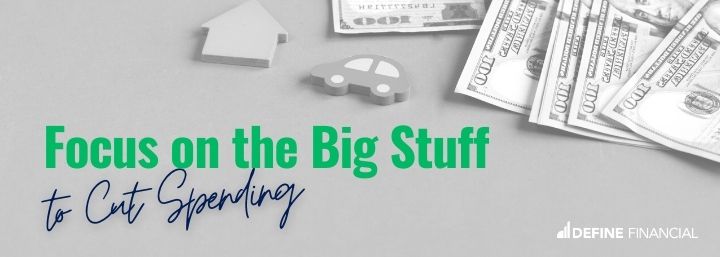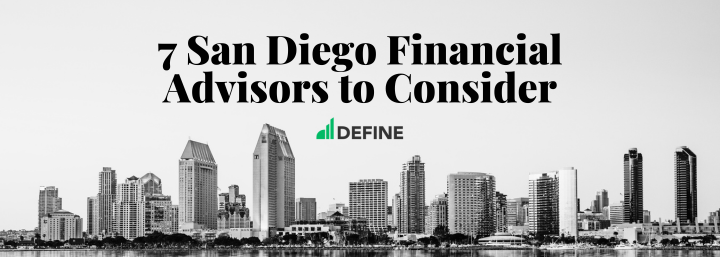
Have you ever wondered why you struggle to save for future goals when you make plenty of money?
You keep trying to cut subscriptions, restaurant outings, and hobbies…but it’s not enough.
There should be plenty of money leftover after your expenses, so what’s going on?
We’ll dig into why tracking your spending can have a profound impact on your life and what you should focus on first when cutting back.
Why Tracking Your Spending Is So Important
At Define Financial, we are big fans of tracking your spending because we think it can have a profound effect on your life.
When you track your spending, you are empowered with the knowledge of where your money goes. Once you have this information, you can figure out if your spending lines up with what you value most. And from there, you can decide to change your spending (or not).
Unfortunately, tracking one’s spending is a foreign concept to most. This is especially true for people who earn a lot of money. They know they’re making “bank” so they assume they don’t need to track their spending.
Newsflash: This assumption is dead wrong.
Tracking Your Spending: A Case Study
Here’s an example of why tracking your spending is so important.
Recently, I met with a couple who had plenty of money to go around. And boy, was it going around! The couple had so much income that they were spending it any way you could think of.
Fortunately, this couple knew they should be tracking their spending — they just weren’t doing it well enough. They were tracking their spending just enough to be dangerous.
I write this because, during our meeting, we discussed how the couple had too many financial goals and not enough money to fund them all. The husband mentioned just how silly it was for them to have three different music subscriptions. On top of that, the wife had a monthly subscription to a granola bar delivery service!
The fact that this couple mentioned these tiny expenses proves that while they were tracking their spending, they weren’t paying attention to it. Because if they had been, they would have realized the music subscription services and granola bar delivery weren’t the real problem.
Something else was.
Housing and Cars
As a financial planner, I don’t have to look at your bank accounts to know where you’re spending too much money. For most people, the bulk of their spending goes toward two things: housing and cars.
These are big-ticket items for all households — they’re necessities. But the couple we met with recently were spending way more than it would take to meet their needs. In fact, they were the poster children for overspending in these two areas.
This couple had purchased a property with more than six acres and two separate buildings. They also had four cars and a motorcycle.
You don’t need a financial planner to tell you that houses and cars aren’t cheap. And really big houses and lots of cars aren’t cheap, either.
No wonder their cash flow was almost nonexistent. They had so much money going out the door toward housing and cars each month that they struggled to keep up.
Focus Here to Save Money
If you’re earning enough money to do well but can’t figure out where your cash is going each month, consider the big two: housing and cars. I’ll all-but-guarantee that housing is your biggest expense — with cars likely in the top five, if not the second highest. (It depends on if you insist on having new wheels every few years.)
This means that while you can cut out your granola bar delivery service, you’ll make a bigger impact if you trim the biggest items in your budget.
You may need to consider downsizing your home to save on upkeep, maintenance, and taxes. Or you may need to drive the cars you have instead of constantly trading up to a new one.
Related: You can cut your expenses in these two categories by optimizing your auto insurance and your homeowner’s insurance.
For the biggest impact to your budget, you can also try to cut all unnecessary spending out of your budget — including the big stuff and the little splurges. But, start with the big line items first. You can always come back to the smaller ones later.
Save What You Don’t Spend
Once you’ve taken the time to whittle down your housing and car expenses, I want you to take the next important step — save that money.
The easiest way to save money is by using automation — setting up automatic bank drafts to a savings or investment account. Automating your savings ensures you won’t forget to transfer the money (and spend your additional funds by accident).
Whether you’re a young professional looking to retire early, a mid-career entrepreneur looking to save money for the next business venture, or a retiree looking to stretch out your nest egg, the most impactful move you can make is shrinking your automobile and housing expenses.
If you do that, you can even keep your membership to the monthly granola bar delivery service.


